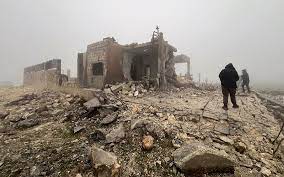Iran missile attack :
Iran attack on Pakistan, Iraq and Syria : Iran’s military, known as the Islamic Revolution Guard Corps (IRGC), recently demonstrated its strength by conducting strikes in Iraq, Syria, and Pakistan. The IRGC asserts that its ballistic missiles have the range to target US bases in the Middle East and Israeli bases in Tel Aviv and Haifa.
Within a short span of 24 hours, the IRGC launched missiles and drones at various locations. One such attack targeted two sites in Pakistan, reportedly in response to the killing of Iranian border guards. However, this drew criticism from Pakistan, which deemed the strikes “completely unacceptable” and warned of “serious consequences.”

Another IRGC attack involved launching ballistic missiles at Irbil, the capital of the semi-autonomous Kurdistan Region in Iraq. This resulted in the death of at least four civilians, prompting the regional government to condemn it as a “crime against the Kurdish people.” Additionally, the IRGC claimed to have destroyed the “headquarters” of Israel’s Mossad spy agency. However, this assertion was rejected by the Kurdistan Region Security Council, and Israel maintained silence on the matter.
The IRGC’s missiles unfortunately hit the home of a well-known Kurdish businessman named Peshraw Dizayee, leading to the tragic loss of both him and his 11-month-old daughter.
An adviser to Mr. Barzani, a Kurdish leader, finds it absurd to suggest that Dizayee was involved in any kind of espionage or worked for Israel. Despite this, Iran’s Foreign Minister, Hossein Amir-Abdollahian, insists that the IRGC did not make a mistake.
Dizayee established two companies, Falcon Group and Empire World, after the US-led invasion of Iraq in 2003. He had close ties with the influential Barzani family. Falcon Group operates in various sectors, including security, construction, and oil and gas, providing assistance to Western representatives and companies in Iraq.
The attack in Irbil highlighted the IRGC’s ability to carry out precise strikes, targeting military installations near Irbil’s international airport, where US and other foreign forces are stationed. The IRGC’s claim of targeting Israeli facilities in Irbil also served a political purpose in Iran following a suspected Israeli strike in Syria on December 25th that killed a senior commander.
On the night of Monday, the Islamic Revolution Guard Corps (IRGC) carried out a missile strike, targeting what they identified as the bases of the Islamic State (IS) group and other “terrorist groups” in the north-western province of Idlib in Syria.
Idlib stands as the final stronghold for Syrian opposition forces after more than a decade of conflict against the government led by President Bashar al-Assad. The longevity of Assad’s regime has been sustained through military support from Russia and Iran. In Idlib, the dominant force is the Islamist group Hayat Tahrir al-Sham (HTS), although the presence of IS and al-Qaeda is also noted.
The IRGC attributed the strikes in Idlib as retaliation for twin suicide bomb attacks carried out by IS in Kerman, southern Iran, on January 3. These attacks resulted in the tragic loss of 94 lives. Notably, the suicide bombings targeted crowds gathered near the tomb of Revolutionary Guards commander Qasem Soleimani, marking the fourth anniversary of his assassination in a US drone strike.
For the Idlib operation, the IRGC claimed to have utilized a Kheibar Shekan (Castle Buster) missile, boasting a range of up to 1,450 km (900 miles). Interestingly, they specified launching the missile from the southern province of Khuzestan, even though the closer western province of Azerbaijan could have been an alternative. This strategic choice in missile selection and launch location hints at Iran’s intention to showcase its capacity to reach various locations in Israel, a neighboring country that shares a border with Syria.
Why did Iran attack Pakistan ?
Iran’s recent attack seems like a response to previous actions by Jaish al-Adl, a group that has targeted Iranian security forces along the border with Pakistan. According to Iranian Minister Abdollahain, Jaish al-Adl found refuge in parts of Pakistan’s Balochistan province and was responsible for killing Iranian security forces. Iran’s strike specifically targeted this group within Pakistani territory.
Back in December 2023, Jaish al-Adl claimed responsibility for an attack on a police station in Rask, near the Pakistan border, resulting in the death of at least 11 Iranian police officers, as reported by AFP. This recent move by Iran appears to be a measure in response to these previous incidents.
On July 23 last year, Jaish al-Adl claimed an attack that resulted in the death of four Iranian policemen patrolling near the border. Jaish al-Adl, founded in 2012, is a Sunni militant group mainly operating in Pakistan.
According to the US Director of National Intelligence, it is the “most active and influential” Sunni militant group in Sistan-Baluchistan. Tehran and Islamabad have accused each other of harboring militants, though direct engagement between official forces is rare. Tehran has repeatedly warned that Jaish al-Adl uses Pakistani soil to launch attacks on Iranian security forces in Panjgur, Balochistan.
Latest Blog: HDFC Bank Shines: Big 34% Jump in Profit to Rs 16,373 Crore, Meeting Expectations; Here’s What Stands Out!

Your article helped me a lot, is there any more related content? Thanks!